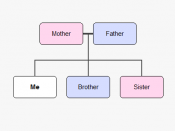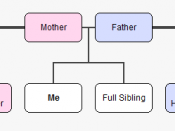Although families are getting smaller, the majority of American children still grow up with at least one sibling, and there is certainly no shortage of speculation about the roles that brothers and sisters play in a child's life. Sibling rivalry is the spirit of competition, jealousy, and resentment that may arise between two or more siblings. For over a hundred years psychologists have been studying how our birth order determines our personalities and relationships.
The reason psychologists find it important to examine birth order is because it can be very revealing. A person's relationship with their parents appears permanently determined by their birth order, and their relationship with their brothers and sisters is the longest they will endure in their lives. The reason for this is because siblings are nearer in age than ones parents and we know them long before we meet our spouses and friends. Many psychologists believe that each person is born with a distinct character and special gift that distinguishes them from every other person in the family tree and society.
When this inner capacity for goodness is identified, acknowledged and nurtured in childhood, it brings strength to society and success to the child. From this platform of success, the child is better equipped to master the challenges of life and experience happiness in relationships.
Psychologists now argue first born children may be more alike other first born children than their own brothers and sisters, and the same applies to second born children and so on. This may explain why most people are friends with people who have the same birth order position as you. Some psychologists even argue birth order should be taken into account in marital choice. This basically means that better marriages may occur between those of similar birth order. One study found birth order can effect your career-successful men were more likely to have their closest sibling another boy rather than a girl-suggesting an early environment of enhanced competitiveness predicts future career attainment.
The first born is an only child until the second child comes along-transforming them from being the center of attention, to now sharing the care of parents. This 'dethronement' from being the focus of a family may be extremely traumatic and so forever shape the first borns outlook on life. After the baby arrives, mothers typically devote less warm and playful attention to their older children, who may respond to this perceived neglect by becoming difficult and disruptive. The first born child may spend the rest of their lives constantly striving to regain their parents' attention and approval.
A first born child may unconsciously feel their parents had another child because somehow the firs born was not good enough, or did something wrong, and this may lay the foundation for permanent feelings of inadequacy against which the first borns relentless need to achieve is pitted. This also contributes to resentment of the second born and subsequent siblings, leading to the finding that the first born is often least warm and frequently most hostile to their siblings, compared to other birth order patterns. First borns always have novice parents; hence they grow up in an early atmosphere of greater parental anxiety than their younger siblings. Parental expectations are usually very high for first born children and they are often given responsibility and expected to set an example.



Bravo!
Wow a very well thought out and interesting essay. The points brough are are certainly enlightening, and like suerra I have meen motivated to research this topic myself.
Good use of vocabulary and sentence flow. Simple yet sophisticated structure and once again - great content!
3 out of 3 people found this comment useful.